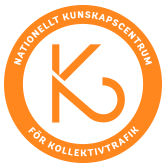A decision support framework for high capacity public transport
A decision support framework for high capacity public transport
In the proposed feasibility study we intent to develop an outline for a decision support framework. The outline of the framework will consist of three elements:
- Based on a literature review, and two case studies, the framework will comprise a gross list of reasons why decisions are made to invest (including, but also intentionally going beyond moving people from point A to point B).
- The reasons identified in step I will be grouped into different decision rationalities (categories will be developed, but could include e.g. transport system rationalities, urban development rationalities, political rationalities, branding rationalities, etc.).
- Based on the literature study and the results from a workshop, we will then identify linkages between decision rationalities and relevant research approaches. The primary objective for this step is to bring clarity on the types of theoretical approaches, and methods that are used to produce results relevant to the different decision rationalities. Where possible, we will also aim to identify state-of-the art knowledge, but given the available resources in this feasibility study, we are well aware that it will be impossible to systematize all relevant existing knowledge. A further important task in this feasibility study is to identify gaps between decision rationalities and the existing knowledge, which could be important for suggesting research needs.
The outline of the decision support framework could thus make different rationalities for the investment visible, and help to identify relevant knowledge and experiences from previous investments. In a more developed form (not within the scope of this project) we believe that the decision support framework could help to improve the chances of decision makers making informed decisions, regardless of what the motives are. Clearly, decision makers may choose to not act in accordance with state of the art knowledge, but bringing rationalities to the foreground, and relating these rationalities to the existing state of knowledge, could still improve the transparency of decision processes. Improving the understanding of all the dimensions that decision makers would like to take into consideration in their choice of public transport solutions is an important task in itself.
A fully developed decision support framework could be useful in early stages of decision making processes. From a Swedish perspective such a framework could be relevant in a Åtgärdsvalsstudie, or similar situations in other national contexts where the framing of problems and options concerning solutions are open. In such situations we believe that there is great value in a decision support framework that facilitates the investigation of the multitude of effects that the selection of transport system solution for high-capacity corridors may have.
